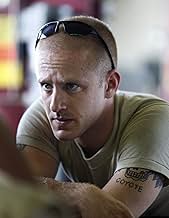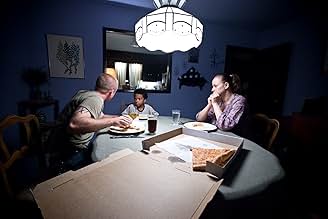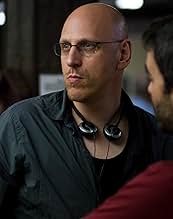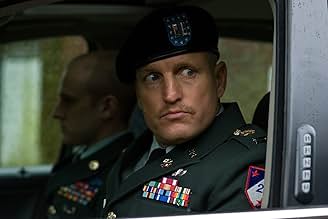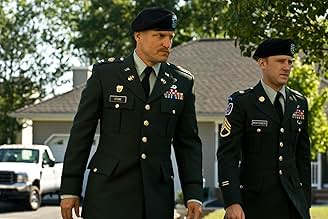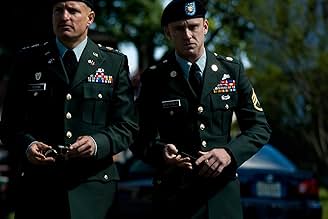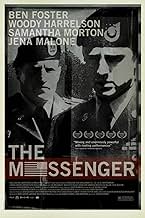AVALIAÇÃO DA IMDb
7,1/10
38 mil
SUA AVALIAÇÃO
Um soldado americano enfrenta um dilema ético quando se envolve com a viúva de um oficial caído.Um soldado americano enfrenta um dilema ético quando se envolve com a viúva de um oficial caído.Um soldado americano enfrenta um dilema ético quando se envolve com a viúva de um oficial caído.
- Direção
- Roteiristas
- Artistas
- Indicado a 2 Oscars
- 17 vitórias e 47 indicações no total
Brian Adam DeJesus
- Teenager #1
- (as Brian DeJesus)
- Direção
- Roteiristas
- Elenco e equipe completos
- Produção, bilheteria e muito mais no IMDbPro
Avaliações em destaque
I saw The Messenger (as well as Oren Moverman and Ben Foster luckily) at the 2009 Philadelphia Film Festival and can say sincerely that I was captivated and moved by it for the majority of its runtime. No matter what your background or stance on the war, you need not worry because it is not a movie that attempts to have an opinion, but merely one that captures a different kind of war- one between civilians and the military, between following procedure and following what you believe.
In his last three months of service, Officer Will Montgomery (Ben Foster), is assigned to be a messenger to next-of-kins who have died in Iraq alongside the elder Lieutenant Anthony Stone (Woody Harrelson). He struggles with being the bearer of bad news to heartbroken parents and wives, delivering the messages to people of all ages, ethnicities, and social classes. His work becomes compromised, however, when complications with his girlfriend arise and he becomes involved with one of the widows, challenging his ethical and moral considerations. He plays the younger, more vulnerable to Harrelson's gruff, uncompromising, and often cold ethic.
The film is, in a word, compassionate, as it is almost entirely character-driven. The chemistry between Foster and Harrelson is incredible, demonstrating talent beyond the range of what one would expect for both actors. I would be very surprised if either one of these two were not nominated for an Academy Award. The cinematography is also very unusual, filmed in long takes, letting scenes unfold, rather than wide/medium/close- up/reverse formula, and heavily based on improvisation.
All in all, The Messenger is a touching story about the differences we can make in others' lives simply by being the right person to break the news and having an open heart. It's a tribute to the men and women in arms without letting political differences get in the way. A story of the war at home shared alike by civilians and military, it's hard not to feel emotionally affected.
In his last three months of service, Officer Will Montgomery (Ben Foster), is assigned to be a messenger to next-of-kins who have died in Iraq alongside the elder Lieutenant Anthony Stone (Woody Harrelson). He struggles with being the bearer of bad news to heartbroken parents and wives, delivering the messages to people of all ages, ethnicities, and social classes. His work becomes compromised, however, when complications with his girlfriend arise and he becomes involved with one of the widows, challenging his ethical and moral considerations. He plays the younger, more vulnerable to Harrelson's gruff, uncompromising, and often cold ethic.
The film is, in a word, compassionate, as it is almost entirely character-driven. The chemistry between Foster and Harrelson is incredible, demonstrating talent beyond the range of what one would expect for both actors. I would be very surprised if either one of these two were not nominated for an Academy Award. The cinematography is also very unusual, filmed in long takes, letting scenes unfold, rather than wide/medium/close- up/reverse formula, and heavily based on improvisation.
All in all, The Messenger is a touching story about the differences we can make in others' lives simply by being the right person to break the news and having an open heart. It's a tribute to the men and women in arms without letting political differences get in the way. A story of the war at home shared alike by civilians and military, it's hard not to feel emotionally affected.
I was fortunate enough to see this at the recent NY Drama Critics showcase, where both the director (Mr. Moverman) and a co-star (Woody Harrelson) participated in after-show Q&A. First of all, the film is superb - but the summaries I've seen so far do not do justice to what the movie is really about. Sure there are ethical dilemmas, sure there are soldiers who have returned from Iraq. But the great strength of this film is its focus on individual human beings and their reaction to humans' most important concerns: life, death and love. Oren Moverman - accomplishing this so beautifully, accurately and subtly in a small-budget film - is to be congratulated. Woody Harrelson, Ben Foster and Samantha Morton are all magically on the same wavelength in their performances. And the writing (by Camon and Moverman) acknowledges the fact that reasonably intelligent people might be watching... people who don't need every little detail spelled out. Oh yes - I should mention that there's a lot of humor interspersed throughout. The result of all this? The people you meet in this film will stay with you for a very long time - and you'll be glad for that.
I'm normally pretty hesitant about watching movies that have to do with war, but I'm glad that I chose to watch The Messenger. The movie took a completely different stance than what I'm used to when watching a movie about war. I never really thought about the people that had to deliver the message about a loved one that died in the military, and the way the story is told made me really care for the characters and feel for Harrelson's and Foster's characters and the important job that they have to perform. I would never want to have to do their job, but I truly respect the people that have to perform that job on a daily basis.
Harrelson, Foster and Samantha Morton put on really powerful performances that I honestly believed. And the rest of the cast did a fine job, as well. The emotion was so intense that I could feel it, and I easily got sucked into the story. It was a powerful movie that really made me think about the hardships in a sincere and thoughtful way. Overall, I enjoyed the film and I will continue recommending it to all my friends because I think everybody should watch it at least once. The story sticks with you long after you finish watching the movie.
Harrelson, Foster and Samantha Morton put on really powerful performances that I honestly believed. And the rest of the cast did a fine job, as well. The emotion was so intense that I could feel it, and I easily got sucked into the story. It was a powerful movie that really made me think about the hardships in a sincere and thoughtful way. Overall, I enjoyed the film and I will continue recommending it to all my friends because I think everybody should watch it at least once. The story sticks with you long after you finish watching the movie.
THE MESSENGER is by far and away one of the best works of art that addresses the deep tragedy behind the current U.S. war in the Middle East that I've seen. THE MESSENGER is an attempt by Director Oren Moverman and screen writer Alessandro Camon to place themselves between the ears of two career soldiers who serve a vital place in U.S. Army Special Services, Casualty Notification teams who inform the families of soldiers that their family member has been killed in battle. As someone who remembers full well the devastating feeling you got in your insides when you saw these teams turn up at the quarters of friends and their families when my own father was serving in Vietnam in the late 1960s, I found the film an important effort.
Staff Sergeant Will Montgomery (Ben Foster) is a Iraqi war veteran recovering from a battlefield wound who is reassigned to a State Department and United States Army Casualty Notification team, which is led by Captain Tony Stone (Woody Harrelson). Montgomery is also facing an impending breakup with his girlfriend Kelly (Jena Malone), who is playing him off against a wealthy, established suitor. When he is assigned to Stone's team, he is at first resentful. The military decorum which is demanded of the Casualty Notification Team is very exacting, with learned routines that come from a spit and polish military professionalism that requires a distance that is extremely difficult to attain.
What follows is a series of well connected vignettes, in which the younger soldier is asked to stride this nether world between the jaundiced, dry-drunk outlook of the seasoned bearer of bad news, Captain Stone. Stone is a bitter man with some frustrated ambitions of his own, which are revealed late in the film. Obsessed with sexual victories and teeter tottering between professional sobriety and complete emotional collapse, Stone is far from a steady colleague mentor. Encounters between he and Montgomery go into emotional roller coaster as each man learns to accept the other on his own terms while acting out an extremely trying professional military role.
In short time, Montgomery comes into contact with the widow of a soldier who sparks his interest, and becomes torn between professionalism and attraction to the young widow Olivia Pitterson (Samantha Morton). Montgomery is forced to grow into himself, despite his outward cynicism, and in short time begins to mentor his mentor, Captain Stone. The story has an open ending, with Montgomery seeking to be part of the life of widow Olivia as she is seeking to reestablish herself in New Orleans. No morals are offered, and this is the true strength of the work as a whole. There isn't much humor to be found here, but watch for the scene where a bender fried Montgomery and Stone attend the wedding reception of the woman who has broken Montgomery's heart. The lampoon of upper middle class phoniness is priceless.
The beauty of THE MESSENGER is that it does not fall into the usual pro war or antiwar camps that film making in an era like our own are usually so encumbered with. The film makers are ambitious and restrained. I have no idea whether the plot line is itself "contrived" as some here have argued, which I have to say is a rather ridiculous critique given that movies are rarely anything but "contrived", and this is particularly true of the genre we call the war film. Some who have written here seem to believe that the film discredits the "professionalism" of those who do the work of Stone and Montgomery, as though "professionalism" were itself some sort of fetish that protects one from emotional or mental illness generated by both war time trauma and the mystique of military culture. Such are the times in which we live, ideological blather is rampant.
THE MESSENGER is important because, in the words of that great Vietnam war era politician, the late President Lyndon Baines Johnson, it is art, it shows us who we are, not who we say we are, not who we think we are, but who we are as a people, and as a political culture. At various moments, it is clunky. But it is an early effort to give some true definition about what the debacle in Iraq has done to our culture, and to the people who are expected to do the dirty work of the empire's war machine. It is a rare gem in mainstream contemporary U.S. film making.
Staff Sergeant Will Montgomery (Ben Foster) is a Iraqi war veteran recovering from a battlefield wound who is reassigned to a State Department and United States Army Casualty Notification team, which is led by Captain Tony Stone (Woody Harrelson). Montgomery is also facing an impending breakup with his girlfriend Kelly (Jena Malone), who is playing him off against a wealthy, established suitor. When he is assigned to Stone's team, he is at first resentful. The military decorum which is demanded of the Casualty Notification Team is very exacting, with learned routines that come from a spit and polish military professionalism that requires a distance that is extremely difficult to attain.
What follows is a series of well connected vignettes, in which the younger soldier is asked to stride this nether world between the jaundiced, dry-drunk outlook of the seasoned bearer of bad news, Captain Stone. Stone is a bitter man with some frustrated ambitions of his own, which are revealed late in the film. Obsessed with sexual victories and teeter tottering between professional sobriety and complete emotional collapse, Stone is far from a steady colleague mentor. Encounters between he and Montgomery go into emotional roller coaster as each man learns to accept the other on his own terms while acting out an extremely trying professional military role.
In short time, Montgomery comes into contact with the widow of a soldier who sparks his interest, and becomes torn between professionalism and attraction to the young widow Olivia Pitterson (Samantha Morton). Montgomery is forced to grow into himself, despite his outward cynicism, and in short time begins to mentor his mentor, Captain Stone. The story has an open ending, with Montgomery seeking to be part of the life of widow Olivia as she is seeking to reestablish herself in New Orleans. No morals are offered, and this is the true strength of the work as a whole. There isn't much humor to be found here, but watch for the scene where a bender fried Montgomery and Stone attend the wedding reception of the woman who has broken Montgomery's heart. The lampoon of upper middle class phoniness is priceless.
The beauty of THE MESSENGER is that it does not fall into the usual pro war or antiwar camps that film making in an era like our own are usually so encumbered with. The film makers are ambitious and restrained. I have no idea whether the plot line is itself "contrived" as some here have argued, which I have to say is a rather ridiculous critique given that movies are rarely anything but "contrived", and this is particularly true of the genre we call the war film. Some who have written here seem to believe that the film discredits the "professionalism" of those who do the work of Stone and Montgomery, as though "professionalism" were itself some sort of fetish that protects one from emotional or mental illness generated by both war time trauma and the mystique of military culture. Such are the times in which we live, ideological blather is rampant.
THE MESSENGER is important because, in the words of that great Vietnam war era politician, the late President Lyndon Baines Johnson, it is art, it shows us who we are, not who we say we are, not who we think we are, but who we are as a people, and as a political culture. At various moments, it is clunky. But it is an early effort to give some true definition about what the debacle in Iraq has done to our culture, and to the people who are expected to do the dirty work of the empire's war machine. It is a rare gem in mainstream contemporary U.S. film making.
The Messenger has incredible acting by Ben Foster, Woody Harrelson, and Samantha Morton.
The film has a curious flow to it. It begins predictable, yet remains engaging, exposing a heart-breaking consequence of war no family wants to face. Although the news remains the same, emotions run just as deep at each door. Every scene is handled marvelously through subtle performances by the actors. As the film unfolds, the viewer sinks into the complex characters on screen, discomforted by the internal struggles that slowly surface.
The Messenger is a non-linear, character-driven film with exceptional performances but might not be for everyone.
The film has a curious flow to it. It begins predictable, yet remains engaging, exposing a heart-breaking consequence of war no family wants to face. Although the news remains the same, emotions run just as deep at each door. Every scene is handled marvelously through subtle performances by the actors. As the film unfolds, the viewer sinks into the complex characters on screen, discomforted by the internal struggles that slowly surface.
The Messenger is a non-linear, character-driven film with exceptional performances but might not be for everyone.
Você sabia?
- CuriosidadesThe scene where Will (Ben Foster) and Olivia (Samantha Morton) speak to each other in her kitchen is eight minutes long and was shot in one take. Co-writer and director Oren Moverman allowed actors and actresses to improvise in certain scenes.
- Erros de gravaçãoSeveral times throughout the movie, Captain Stone notifies next of kin of deceased soldiers without first getting positive confirmation that they are, in fact, the soldier's next of kin. Casualty Notification Officers are required to make sure that the person they are addressing is actually the next of kin before making notification. This is not a mistake that a professional like Captain Stone would make.
- Citações
Captain Tony Stone: [walking to deliver the news to a wife that her husband has died] It could be worse. It could be Christmas.
- Versões alternativasThere are two versions available. Runtimes are "1h 53m (113 min)" and "1h 45m (105 min) (Berlin International) (Germany)".
- ConexõesFeatured in The Rotten Tomatoes Show: Zombieland/A Serious Man/Whip It (2009)
- Trilhas sonorasPut Your Hands Up
Performed by Plive (as P-Live)
Written by Christian Salyer, Isaiah Perkins
Published by Engine Co. 30/4tian Music/Engine Co. 35/4tian2 Music
Courtesy of 5 Alarm Music
Principais escolhas
Faça login para avaliar e ver a lista de recomendações personalizadas
Detalhes
- Data de lançamento
- País de origem
- Idiomas
- Também conhecido como
- El mensajero
- Locações de filme
- Empresas de produção
- Consulte mais créditos da empresa na IMDbPro
Bilheteria
- Orçamento
- US$ 6.500.000 (estimativa)
- Faturamento bruto nos EUA e Canadá
- US$ 1.109.660
- Fim de semana de estreia nos EUA e Canadá
- US$ 44.523
- 15 de nov. de 2009
- Faturamento bruto mundial
- US$ 1.595.417
- Tempo de duração1 hora 53 minutos
- Cor
- Mixagem de som
- Proporção
- 2.35 : 1
Contribua para esta página
Sugerir uma alteração ou adicionar conteúdo ausente





